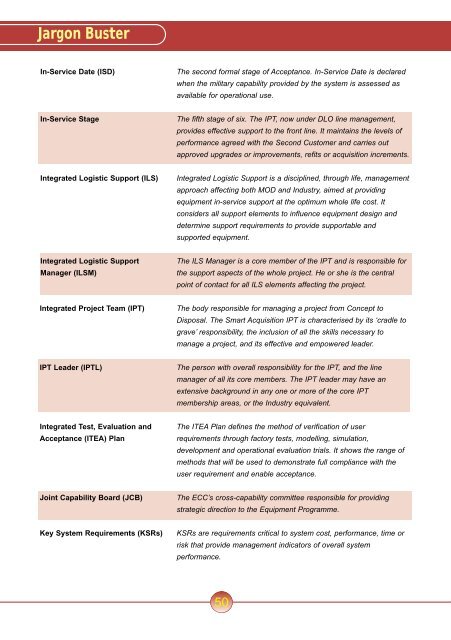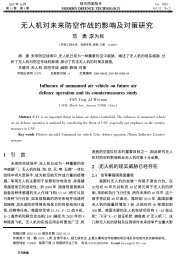The Acquisition Handbook
The Acquisition Handbook
The Acquisition Handbook
- No tags were found...
You also want an ePaper? Increase the reach of your titles
YUMPU automatically turns print PDFs into web optimized ePapers that Google loves.
Jargon BusterIn-Service Date (ISD)<strong>The</strong> second formal stage of Acceptance. In-Service Date is declaredwhen the military capability provided by the system is assessed asavailable for operational use.In-Service Stage<strong>The</strong> fifth stage of six. <strong>The</strong> IPT, now under DLO line management,provides effective support to the front line. It maintains the levels ofperformance agreed with the Second Customer and carries outapproved upgrades or improvements, refits or acquisition increments.Integrated Logistic Support (ILS)Integrated Logistic Support is a disciplined, through life, managementapproach affecting both MOD and Industry, aimed at providingequipment in-service support at the optimum whole life cost. Itconsiders all support elements to influence equipment design anddetermine support requirements to provide supportable andsupported equipment.Integrated Logistic SupportManager (ILSM)<strong>The</strong> ILS Manager is a core member of the IPT and is responsible forthe support aspects of the whole project. He or she is the centralpoint of contact for all ILS elements affecting the project.Integrated Project Team (IPT)<strong>The</strong> body responsible for managing a project from Concept toDisposal. <strong>The</strong> Smart <strong>Acquisition</strong> IPT is characterised by its ‘cradle tograve’ responsibility, the inclusion of all the skills necessary tomanage a project, and its effective and empowered leader.IPT Leader (IPTL)<strong>The</strong> person with overall responsibility for the IPT, and the linemanager of all its core members. <strong>The</strong> IPT leader may have anextensive background in any one or more of the core IPTmembership areas, or the Industry equivalent.Integrated Test, Evaluation andAcceptance (ITEA) Plan<strong>The</strong> ITEA Plan defines the method of verification of userrequirements through factory tests, modelling, simulation,development and operational evaluation trials. It shows the range ofmethods that will be used to demonstrate full compliance with theuser requirement and enable acceptance.Joint Capability Board (JCB)<strong>The</strong> ECC’s cross-capability committee responsible for providingstrategic direction to the Equipment Programme.Key System Requirements (KSRs)KSRs are requirements critical to system cost, performance, time orrisk that provide management indicators of overall systemperformance.50
















